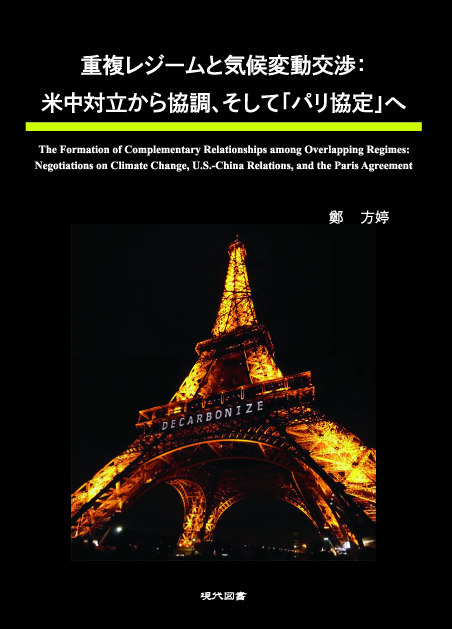
Title
Chofuku Rejimu to Kikohendo Kosho: Beichu Tairitsu kara Kyocho, Soshite“Parikyotei” he (The Formation of Complementary Relationships among Overlapping Regimes: A Case Study of the Post-Kyoto Climate Change Negotiations)
Size
233 pages, A5 format, hardcover
Language
Japanese
Released
March 19, 2017
ISBN
978-4-434-23088-2
Published by
Gendai Tosho
Book Info
See Book Availability at Library
Japanese Page
Climate change has been causing serious impacts on all human beings and creatures on the planet. To address this issue, in 2015, countries belonging to the United Nations (UN) adopted the Paris Agreement, which is the successor of the Kyoto Protocol. This book argues that the “critical roles” played by two major powers, the United States and China, were the keys to reaching agreement. Since there have been only a few detailed and systematic analyses of the US and Chinese roles played in the climate change negotiations, this book discusses the influence of the US and China, based on a review of regime theories, the discourses and documents of political leaders, and interviews with policy-makers, through the studies of a decade-long (2005–2015) negotiation led by both the UN and major powers.
Traditionally, the US and China had not only been on the side of exacerbating the global environmental problems, but also being “foot-draggers” by causing a stagnation in negotiations over an international agreement to solve these problems. After the US’s withdrawal from the Kyoto Protocol in 2001, the US and China blamed each other for their actions and responsibilities in addressing climate change. The US–China relationship at this time resembled the composition of “the prisoner’s dilemma,” that is, the decisions made by the two parties based solely on their own best interests led to the most unfavorable outcomes, resulting in the two largest countries with the highest greenhouse gas emissions (GHGs)—in 2005, it was 17.9% in the US, and 19.2% in China, which together comprised 37.1% of worldwide emissions—turning their backs on substantial actions, with both countries receiving severe criticism from international societies.
This stalemate, however, changed little by little through multilateral and bilateral negotiations, along with the change of political leaders in the two countries. Indeed, the US and China created various platforms based on their own interests and preferences while trying to involve each other, in the hope of coming to an agreement on their own terms. Therefore, a situation called “forum-shopping” occurred, and those platforms also competed in leading the negotiations. Fortunately, this situation gradually disappeared through the establishment of complementary relationships among platforms, which eventually caused countries to agree altogether and sign onto a single UN treaty.
To form a complementary relationship among competing regimes, two conditions were set forth in this book. The first is that “concepts and ideas that give direction to competing regimes are shared by the countries concerned, especially the major ones”; while the second is that “the major countries can play their critical roles toward such a direction.”
In fact, in parallel with UN, the US and China have negotiated over climate change in various settings, such as the Asia–Pacific Economic Cooperation (APEC), the G20 summit, the G7, and so on. Through repeated and continuous dialogues and the enhancement of mutual understanding, the two countries successfully achieved a bilateral agreement to cut their own GHG emissions while actively investing in low-carbon technologies and solutions. Although this book ends with the adoption of the Paris Agreement in 2015, the same argument can also apply to subsequent negotiations—albeit in an opposite way.
In particular, the situation changed after President Donald Trump, a Republican, took office in 2017. His decision to withdraw from the Paris Agreement and the outbreak of US–China trade disputes have undoubtedly made Sino–US relations worsen. China became negative about addressing climate change, and refused to officially raise its emissions reduction target. As a result, world CO2 emissions from energy and industry increased in 2017 and 2018, following a three-year period of stabilization. At the same time, negotiations under the UN turned out to be stagnant, and there has been little progress that has been considered politically important over the past few years.
I hope that the debates and assertions in this book on the critical roles that major powers can play will not only be applied to climate change and other global environmental problems, but also to research fields such as trade and foreign policy. (This book description was written in December 2019.)
(Written by: Fang-ting Cheng / October 28, 2020)
Table of Contents
Chapter 2: Theoretical Perspective on the Formation of Complementarity between Overlapping Regimes
Chapter 3: Development of Overlapping Regimes toward the UN Copenhagen Climate Conference
Chapter 4: Development of International Negotiations over the Post-Kyoto Protocol
Chapter 5: Background and Negotiation Process toward the Adoption of the Paris Agreement
Chapter 6: Formation of US–China Cooperation and International Agreement
Chapter 7: Conclusion: Formation of the International System and US–China Relations
Related Info
https://www.ide.go.jp/English/Researchers/cheng_fangting_en.html



